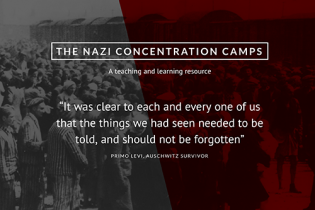The Birkbeck Institute for the Study of Antisemitism is committed to making academic scholarship accessible to a wide public.

The Fortunoff Archive consists of over 4,400 testimonies of Holocaust survivors, witnesses and liberators. Other resources include songs, podcasts and essays by international scholars.
The Birkbeck Institute for the Study of Antisemitism is an Access Site for the Fortunoff Archive. Click the link to learn how to search the collection for materials relevant to your research. This includes step by step instructions on how to register in Aviary and access the collection.

The International Holocaust Remembrance Alliance (IHRA) working definition of antisemitism is a non-legally binding working definition of antisemitism and 11 contemporary examples, taking into account the overall context in which they arise.
The working definition is intended to be used as a tool to raise awareness of the ways antisemitism can manifest itself, and so help individuals, organizations and government bodies identify and address antisemitism in their societies.

The Jerusalem Declaration on Antisemitism is a tool to identify, confront and raise awareness about antisemitism as it manifests in countries around the world today. It includes a preamble, definition, and a set of 15 guidelines that provide detailed guidance for those seeking to recognize antisemitism in order to craft responses.
The JDA was developed by a group of scholars in the fields of Holocaust history, Jewish studies, and Middle East studies to meet what has become a growing challenge: providing clear guidance to identify and fight antisemitism while protecting free expression.

This project focuses on country houses in the UK and continental Europe owned, renewed and sometimes built by Jews and those of Jewish origin. It is the first project of its kind to attempt to write these houses and their owners back into British, European, and Jewish history and to establish their importance as sites of European – and Jewish – memory.
The website features research news and events, books and a downloadable Resource Pack. The work is led by the University of Oxford in partnership with the heritage sector, including the National Trust.

This award-winning website presents the stories of generations of migrants who came to and shaped the British Isles over more than a thousand years. Drawing on the research of over 60 historians, the stories of migrants, including Anglo-Saxon, African, Irish, Indian, Italian, Jewish and Polish peoples, are told through a diverse range of source material and videos.
‘Our Migration Story’ has been developed by the Runnymede Trust and academics based at the universities of Cambridge and Manchester; it is intended for teachers and students studying migration to Britain. However, it is a useful resource for anyone interested in Britain’s migration history.

World-famous as a royal fortress and prison, the Tower of London is also one of the most substantial standing remains of medieval England’s Jewish history. From the mid-twelfth century to the expulsion of the Anglo-Jewry in 1290, the Tower was both a place of imprisonment and of refuge for hundreds of Jews.
Click the link to access a catalogue of archival sources of over 700 manuscripts for the Jewish history of medieval London and the Tower and a dataset of Jewish prisoners, refugees, and staff at the Tower from c.1189 to 1290, with biographies of over 150 named individuals and hundreds more unnamed.

The first authoritative online educational resource about the camps written and curated by Professor Nikolaus Wachsmann, Professor in Modern European History at Birkbeck, University of London, and author of the prize-winning book ‘KL. A History of the Nazi Concentration Camps’.
The website features original documents, maps, films and testimonies as well as teaching resources developed by the UCL Centre for Holocaust Education.

In an age of populism and nationalism it is more important than ever to understand the connections between antisemitism and other forms of racialization.
Professor David Feldman, Director